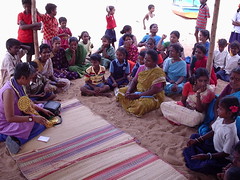
when the tsunami - a word none of us knew post 26/12 - waves hit the shores of India on a fateful sunday morning, I did not know that it would create ripples in a little planet tucked away in a small delhi slum.
we set about collecting money for a boat, and we managed to do so in record time. today a beautiful little fishing boat proudly bears the name 'project why' as it bobs on the East Coast of India bringing new hope to little children and their families.
in project why classrooms, a picture the little brightly coloured boat is displayed on the walls with great pride, creating new yet invisible bonds.
now as we all know the tsunami relief operation did go a bit out of hand as the world found its lost conscience and wanted to put it to use in a hurry. we managed to convince some donors to set aside a little money for the children of a fishing village and my visit to chennai was to try and see what could be done to erase some of the terrible memories that little minds still carry, and that are often not understood by elders.
A drive along the East Coast Road brought to light many realities that we are unaware of. Several villages have been affected and the fisherman now live in 'camps' some of which look unreal, I was horrified by one where dwelling units were made of hessian cloth dipped in black tar, and looked like a vision of hell, others looked a little more welcoming and they used natural thatch. DV Sridharan my guide for the visit, pointed out something I would have missed: carefully worded panels that almost 'invited' you to visit these camps. I was appaled by the lack of sensitivity that made a human tragedy into a new form of tourism..
More disturing however was the fact that today many villagers have made releif their main 'economic' activity, with fishing taking second place... here again we are made aware of the thin and invisible line that lies between helping and handicapping. When fishermen stop fishing something has gone terribly wrong... whe people start concealing reality in the hope of getting more, the purpose of aid gets defeated... this is something we have also faced time and again, and to my mind herein lies the litmus test of any development work: the ability to know when to stop!
Alas this is easier said than done as the problem does not lie only with the recepient but also with the donor who rides on the high of becoming a temporary god or at least saint of the day!
Then what does one do, become a follower of Diogenes and sink into cynicism, or does one carry on with the hope of being able to stop when the need arises.
That is the question.
